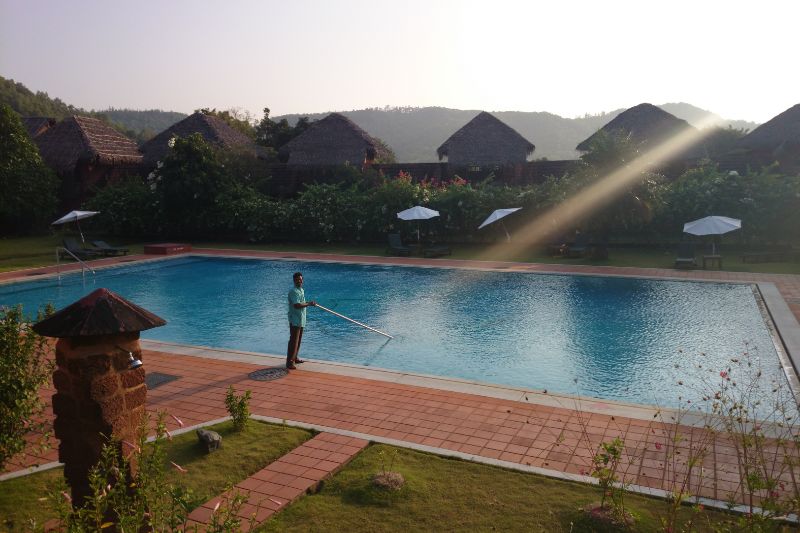No products in the cart.
Pool Cleaning Tips You Should Definitely Know

Pool ownership can be a wonderful experience: feeling the sun on your skin, taking leisurely dips in crystal-clear water, and having fun with friends – it’s all part of the appeal. But just as with any other form of home ownership, there are some necessary chores associated with keeping your pool up to par. Don’t worry though! By following these simple pool cleaning tips from experts you’ll do more than just keep your upkeep worries to a minimum – you’ll be sure you’re doing the best job possible preserving your beautiful outdoor oasis so it can provide years of enjoyable use. Let’s dive right into what you need to know when it comes time for routine and preventive maintenance of your swimming pool!
The Basics of Pool Cleaning and Maintenance
Keeping your pool clean and well-maintained is essential for inviting guests to splash around and making sure everyone stays healthy. But it’s not always an easy process, even for experienced pool owners. For instance, removing stubborn algae stains can be one of the toughest problems to tackle, but luckily there are a few basic tips that can help you remove algae stains from your pool without breaking a sweat. If you have an automatic pool cleaner, make sure to use it regularly to help with algae prevention and also to keep your pool free from debris and pollen. Keeping pH levels in check is also essential for successful algae stain removal. Other basic things you should understand include skimming the surface regularly, brushing walls and steps weekly, checking chlorine levels often, and backwashing your filter occasionally. Doing these things consistently can keep your pool sparkling and inviting all summer long!
How to Test Your Pool Water
If your pool’s pH and other chemical levels are off, you may end up with an unexpected green pool or even an unpleasant odor coming from the water. Knowing how to properly test your pool is essential for keeping it safe and enjoyable. With a few simple tests, you can ensure that the chlorine and other chemicals in your pool are balanced to keep in-water activities as fun and safe as possible. To best maintain your pool water quality, be sure to check your chemical levels once a week by testing the pH, total alkalinity, free available chlorine, stabilizer, and calcium hardness values. Doing so regularly will help you recognize any potential problems before they arise – allowing you to keep clean, clear pool water all summer long.
What Different Chemicals Are Used for Cleaning a Pool
Chlorine is arguably the most popular and common chemical pool owners use to keep their pools safe, clean, and clear. Chlorine works by getting rid of bacteria and other contaminants in the water. In addition to the chemicals you will use for the pool, you would want to ensure that the landscaping around the pool is also in tip-top shape. More so, make sure not to accidentally spill any of the chemicals on the landscaping around the pool. Other chemicals such as algaecides, alkalinity increases, and pH balancers also help keep a pool sanitary by killing algae and maintaining balanced levels of pH. With these chemicals paired with regular cleaning maintenance and backwashing, your once murky green water can easily become crystal clear again!
How to Effectively Vacuum Your Pool
Whether you’re a pool expert or just starting out, there are some tips that can make the experience easier and less time-consuming. Make sure to set aside enough time so that the vacuuming can be done properly; ideally, you don’t want to rush through the process: run the right cycle on your filter ahead of time; use a brush to loosen up debris before vacuuming; adjust the skimmer valve flow so the cleaner works its way across the entire surface; check for any blockage in hoses or vacuum heads; and look for any signs of dirt remaining after completing. With these steps in mind, effective and efficient vacuuming of your pool is entirely possible.
What Tools Are Necessary for Cleaning a Pool
Some basic supplies every pool owner should have included a leaf net, telescoping pole, hose or vacuum, a brush head, and an algae scrubber. A leaf net can be used to scoop floating leaves off of the surface of the water. Telescoping poles are designed with multiple sections that can be extended to reach hard-to-reach areas on the top, sides, bottom, and corners of your pool without needing to get in the frigid water yourself. There are also a variety of different types of hoses available for all sorts of tasks, such as vacuuming debris from the bottom of the pool. Brushes are essential for scouring surfaces and keeping them free from dirt while an algae scrubber effectively removes stubborn green slime from dusty surfaces such as concrete or stone walls and floors.
Techniques for Skimming the Surface of a Pool

For example, when skimming the surface you should use a wider net and move back and forth in wider sweeps. By using a wider sweep, you’ll be able to reach farther into the corners, where debris can easily collect. Another tip is to begin at one end of the pool, doing an entire length, and then returning without overlapping since this helps cover more area while also preventing anything from being missed. If you have any plants in your pool these areas need to be given special attention since they are prone to collecting debris.
In conclusion, it is important to learn the basics of pool cleaning and maintenance before you begin your own cleaning routine. Knowing how to properly test the water and use the necessary chemicals will prevent bacteria or algae from damaging or discoloring your pool. It is also necessary to know how to effectively vacuum your pool on a regular basis as well as have the proper tools for result-driven skimming. Taking these steps as part of your pool cleaning routine will ensure that your pool stays clean and inviting for many summers to come.










Leave a Reply